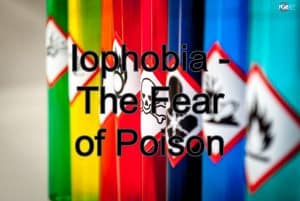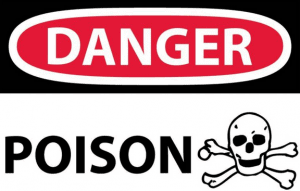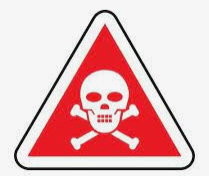Share This Article
The Antidote for the Fear of Poison
Are bug sprays and cleaning agents a complete no-no for you?
Do you throw away suspicious-looking bottles, because you fear the content is poisonous and may lead to your death?
If you find yourself saying yes to these questions, you may be suffering from iophobia, or the fear of being poisoned.
Understanding Iophobia, the Fear of Poison
Snow White being poisoned by the witch with a red, juicy apple may have impacted you more than you think. Stories such as this may have contributed to your irrational fear of poison. They may have driven you to suspicion and an overwhelming feeling that substances such as chemicals will cause your death.

While some chemicals are hazardous to your health, it isn’t healthy to entertain a fear of poison all the time. You may even be afraid to inhale for fear of breathing in poisonous toxins in the air. If you struggle with the real fear of poisons, it’s time to deal with it. Learning about iophobia is a great place to start.
The Reality of Iophobia
Your family and friends might assume that you exaggerate and want attention. You may find yourself needing plenty of assurance for something that you can’t understand or explain. All you know is you get uncontrollably anxious when you think about poison or being poisoned.
Living in this kind of fear is unhealthy, and it can be destructive to your daily activities and relationships. You can’t fully comprehend what’s going on aside from the fear that’s gripping you. Unfortunately, those around you may gradually become uncomfortable in your presence, especially if you’re prone to panic attacks.
You Are Not Alone
This fear is real, and it impacts your life negatively. The only consolation from the blinding terror is that other people share the same experience as you. Many have the same thoughts and assumptions, fears, and anxieties. There are those out there who know what it’s like.
Remember, this fear can be controlled and managed. Other people have done it, and so can you.
What Are Iophobia Causes?
Iophobia can be rooted in genetics and even the environment you’re in. Scientifically and like most phobias, there is no known cause.
You are more vulnerable to iophobia if your family has a history of mental disorders, particularly anxiety disorders. You may be genetically inclined towards the same anxiety issues.
Has Someone Close to You Been Poisoned?
Another factor to consider is whether there are any experiences upon which your fear is founded. For instance, perhaps someone you knew or who was close to died from being poisoned. Perhaps you have a family member who experienced a life-threatening illness from working in a factory where they were exposed to toxic fumes and chemicals. Your family may have been wary ever since about poison and its effects due to that experience.
What started as reasonable precautions and reminders may have triggered irrational fears and overwhelming emotions.

Do You Have a Pre-Existing Anxiety Disorder?
Another plausible cause of iophobia is if you have a pre-existing anxiety disorder that progressed into a phobia such as this. As an example, if you have an obsessive-compulsive disorder, or OCD, this can develop into an irrational fear of poison or fear of being poisoned.
You may already be experiencing underlying anxiety and obsession about the dangers of hazardous materials, so it’s easy for the mind to become panicked whenever you think about poison. Additionally, existing conditions like depression and generalized anxiety disorder (GAD) can have a similar effect.
Everything You Need to Know about Iophobia
Do you become irrational and lose control whenever you think about poison and the possibility of being poisoned? Then naturally, you want to know what’s happening to you.
What Is Iophobia?
Iophobia is the irrational fear of poison or of being poisoned. It comes from the Greek word io, for poison or rust, and phobia, which means fear. Understandably, this phobia is also referred to as toxiphobia.
Sure, everyone has some level of fear of being exposed to poison or ingesting poison. It’s a reasonable fear. But a persistent, irrational, and unexplained wariness of chemicals, substances, and other elements you assume are intended to poison you makes the difference.
Iophobia Can Interfere with Everyday Life
It can reach a point where it starts to interfere with your life because your thoughts are too distressing. Your fear can affect how you function and relate with other people. In extreme cases of iophobia, you might even refuse to drink or eat anything that you have not prepared yourself for fear of being poisoned.
Someone with this phobia may go to painstaking lengths to avoid being exposed to things and substances they believe are poisonous. For example, you might find yourself locked inside your house with all the shutters closed because you believe the cars passing by give off poisonous fumes.
Symptoms of Iophobia
The symptoms of iophobia are the same as most phobias. Depending on the gravity of the condition, you might even suffer panic attacks.
Overall, the indicators of iophobia are categorized as either physical or mental/emotional symptoms. See if you can recognize yourself in the following symptoms.
Physical Symptoms
- Breathlessness
- Confusion
- Dizziness
- Dry Mouth
- Headache
- Hyperventilation
- Muscle tension
- Nausea
- Palpitations
- Sweating
Mental/Emotional Symptoms
- Anxiety
- Irritability
- Mood Swings
- Reluctance to eat or drink any food
- Paranoia of being poisoned
- Too many assumptions
How Do You Deal with Iophobia?
There is no specific treatment for iophobia, but your terror of being poisoned needs to be addressed and acted on accordingly. You know that your fear is baseless. Despite your best efforts to be stronger than your fear, it always gets the best of you.
The good news is there are plenty of proven ways to deal with iophobia. Your apprehension will still be there but you can minimize it to such a degree that you won’t be bothered by it anymore.

Self-Help: Dealing with Iophobia
This is your battle. You call the shots when it comes to being stronger than your fear or allowing it to get the better of you. You can also be your own best motivator. You know your limits, but you also know how hard you can push yourself if you want and need to.
Here are some of the self-help methods you can adopt in managing iophobia:
- List the ways you were managing your fear before.
- Learn a breathing and relaxation technique like yoga.
- Create self-affirmations and build self-confidence.
- Confide in people you trust and share what you are going through.
- Accept the realities surrounding your phobia.
- Be prepared for setbacks.
- Accept your fear and that it is part of you.
- Be determined to control and manage your fear.
Getting Professional Help
Sometimes, you need the help of a medical professional to get your phobia in check. A trained professional’s experience and knowledge about phobias can make all the difference in ensuring that you make significant and timely progress in winning the battle over your phobia.
Most professionals will discuss different methodologies you can try. Ultimately, you’ll need to be open and willing to give iophobia treatment a go.
Here are the common treatments used for iophobia:
- Exposure therapy
- Mindfulness-based stress reduction (MBSR)
- Cognitive behavioral therapy (CBT)
- Dialectical behavior therapy (DBT)
- Mindfulness meditation practice
- Psychiatric medications
Living with Iophobia
Iophobia is a cultivated fear and may not be easy to overcome. Unfortunately, the recommended self-help methods and even professional techniques are not 100 percent guaranteed. However, hold on to the hope that you can reduce the impact of your fear and make it more manageable. With the help of different coping techniques, you can slowly recover and begin living your life again.
In Conclusion
Don’t wait for Prince or Princess Charming. You can break the spell and return to the life you once enjoyed. You can do this. No poison should be so powerful that it keeps you from doing the things you want to. There is a remedy to your iophobia. It’s based on your determination to be stronger than your fear.
Similar Posts-Fear of Chemicals




